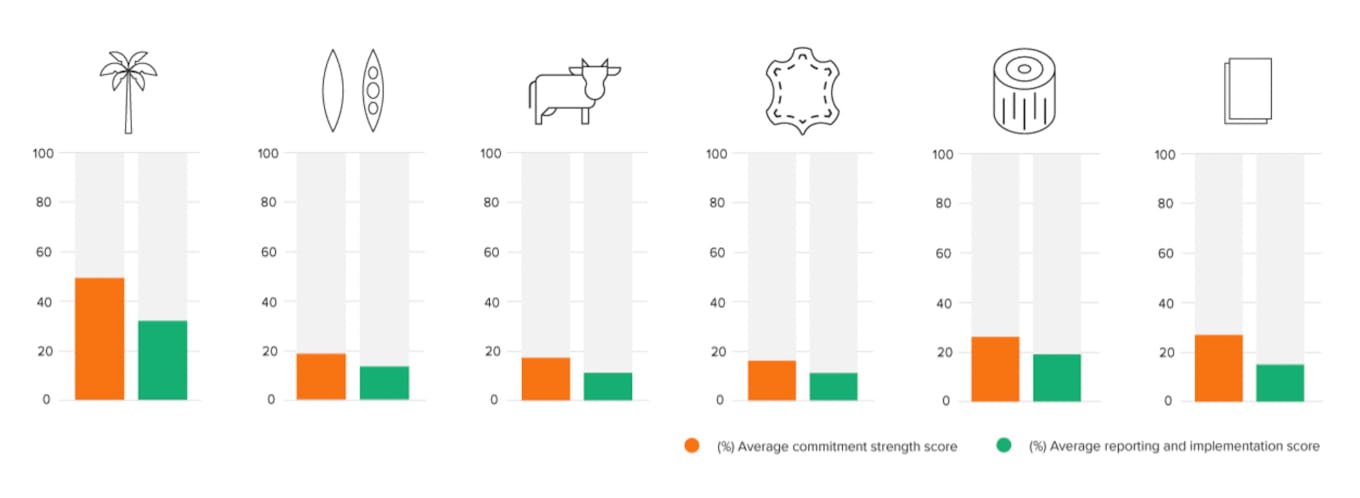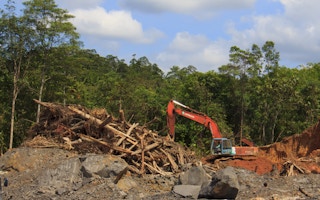Most companies that use agricultural products are unprepared for regulations to halt and reverse deforestation, a report by United Kingdom-based non-profit Global Canopy has highlighted.
To continue reading, subscribe to Eco‑Business.
There's something for everyone. We offer a range of subscription plans.
- Access our stories and receive our Insights Weekly newsletter with the free EB Member plan.
- Unlock unlimited access to our content and archive with EB Circle.
- Publish your content with EB Premium.
Although the recent COP26 negotiations failed to reach consensus on phasing out fossil fuels, one positive outcome of the climate talks was a commitment from world leaders to end deforestation by 2030 — but most major companies that produce, buy and use forest-risk products do not have commitments in place to curb deforestation, the Forest 500 report found.
Published on Thursday, the Forest 500 report tracks the policies of the 350 most influential companies and 150 financial institutions linked to deforestation in their supply chains and investments. Protecting forests, particularly carbon-rich tropical forests, is key to efforts to limiting man-made global warming.
The report warned that companies are poorly prepared for changing regulations, with new laws in the UK and proposals in the European Union requiring companies to ensure that imported goods are not linked to forest clearing.
The study found that one-third of these companies do not have no-deforestation commitments in place for any of the forest-risk commodities they are exposed to through their operations or supply chains. Those firms include Capri Holdings, which owns the luxury fashion brands Versace, Jimmy Choo and Michael Kors.
Only 28 per cent of Forest 500 firms have a deforestation commitment for all of the commodities they produce, buy and use; palm oil, beef, paper, timber, leather, and soy.
Among the banks that finance the commodity firms, only 38 per cent had a clear deforestation policy, according to the study. The financial institutions without policies have provided US$2.6 trillion in finance to the companies with the highest exposure to deforestation risk. They include BlackRock, Vanguard and State Street, the world’s three biggest asset managers.
About a third of the companies that had made overarching deforestation commitments do not have commitments for all of their commodities. These companies include Swedish-retailer IKEA and American breakfast cereal brand Kellogg.
Companies have the strongest no-deforestation commitments in place for palm oil — an ingredient found in half of all supermarket products that has long been heavily scrutinised by environmental groups — and the weakest for beef and leather.
About two thirds (64 per cent) of companies that have beef in their supply chains do have any deforestation commitment for their beef supplies. Beef has been dubbed “the new coal”, as climate-conscious consumers lose their appetite for eating cows.

How commodities fare on deforestation commitment planning and implementation among the Forest 500. From left to right, symbols denote palm oil, soy, beef, leather, timber and paper. Image: Forest 500
The report also found commodity-linked companies struggling to implement no-deforestation commitments. Forty companies did not report on progress they have made on their deforestation commitments for the commodities they have commitments for, according to the report. Companies are much more likely to report on their progress in palm oil supply chains, and least likely to do so for beef and leather.
Global Canopy executive director Niki Mardas said in a statement: “Last year saw unprecedented political action as more than 140 governments recognised the urgent need to protect forests, yet most companies and financial institutions with the greatest ability to halt deforestation are doing little or nothing.”
“As major consumer governments start to translate these commitments into hard and fast legislation, businesses which have not taken deforestation seriously are woefully unprepared and face real risks,” he said.

















